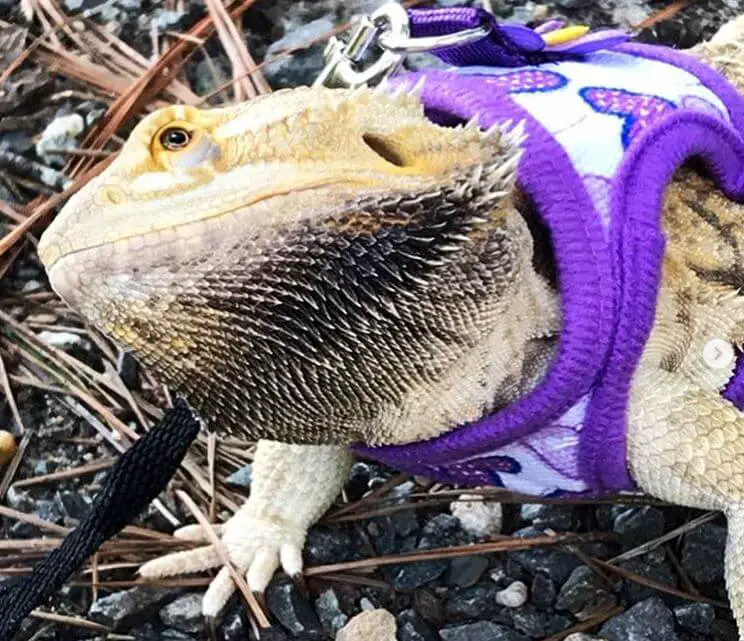There are some reasons for your beardie black beard such as improper temperatures, habitat, feeling threatened, and illness. Some of them are harmless while the others may be a sign to show that your beardie is not healthy. In case you are wondering: “Why is my bearded dragon’s beard black?”, you must find out the solution to solve that problem quickly and carefully.
Below are some common explanations for a black beard on bearded dragons, hoping they may give you helpful information to figure out the answer to your question.
Related Posts:
- Why Is My Bearded Dragon’s Mouth Open? Reasons and Tips
- Bearded Dragon NOT Eating or Pooping: Tips and Tricks
- Why Is My Bearded Dragon Closing Eyes When Stroked?
- Why Is My Bearded Dragon Breathing Heavy?
- Reasons Why Your Bearded Dragon Turned White and Died
Why Is My Bearded Dragon’s Beard Turning Black?
1. Trying to Regulate Their Temperature
As a cold-blood reptile, your beardie has to raise the heat inside his body by absorbing the sun or the UV lights in the tank.
So it is normal for your pet to turn all of his body into black to warm up faster and may stay like that for a few hours after the cold night or every time the cage is cold.
You should prepare a thermometer to check the temperatures in the tank, such as UV lights, all to make sure your pet doesn’t get cold.
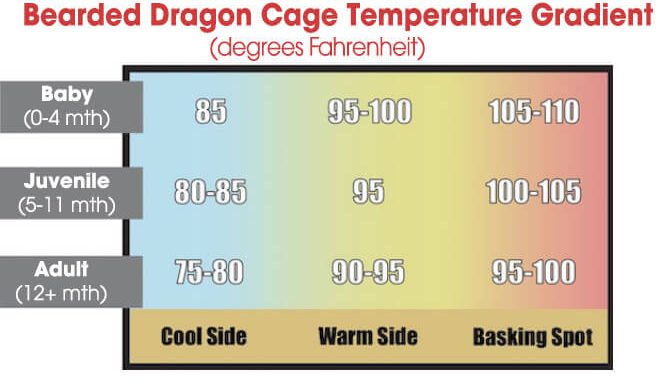
You could design the tank so that it has the basking spot, the warm, and the cold side to let your beardie stay comfortable.
2. Adjusting to the New Place If You Relocated
The beardie beard staying black during the relocation is not something you should be startled.
The sudden change of the place may make your pet always look at the surroundings and ready to attack, which causes stress and worries.
It is not a difficult issue to solve because all he needs is more time and space to become familiar with, feeling safe in a new home, which allows him to come back to the original color.
3. Readying for the Mating Season
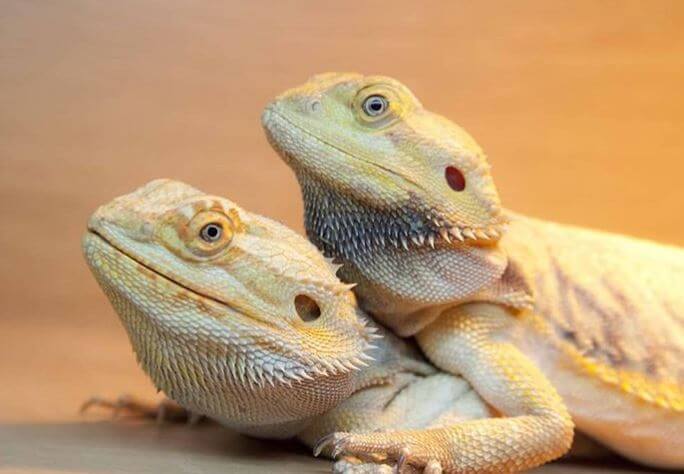
When the one outside the wild environment has a breeding season, the beardies that have been kept as pets can match all year round.
However, the breeders usually prefer to mate in the spring after their brumation.
If you see your beardie has his chin darkened that comes along with a bobbing head, it is certainly a sign to show that your beardie is flirting and ready to mate.
It not only occurs in males after five or six months old but also happens in females.
However, they could be super aggressive, easy to get mad during their mating season, and should be handled carefully.
You can let your pet to roam around the room, which will help to consume the energy.
4. Calling for Your Attention
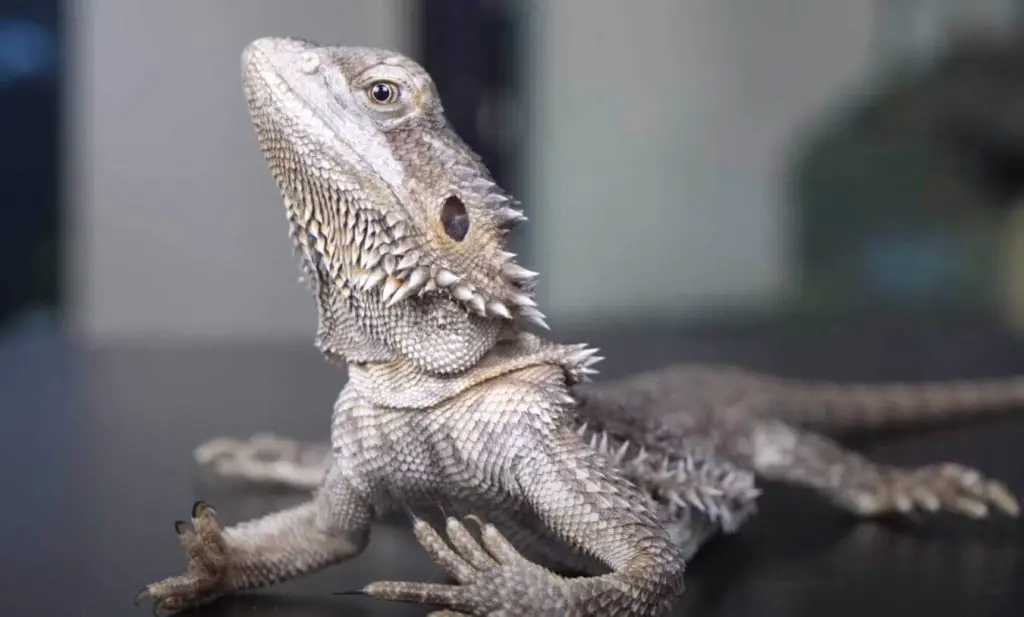
Known as a smart reptile, so when the beardies need to get your attention, they may stand against the glass of their tanks and use their dark beards to catch your eyes.
If you have met all of their needs about food, water, and the quality of the tank, and you still wonder: “Why is my bearded dragon’s beard black?”, do not worry, they just want your attention.
It may happen when they are bored and want to go out of their cage to roam around the room and explore or just be fancy about the idea of spending time with you.
In the case that your beardie blackens his chin right after you had spent time with it, do not worry because it may be the way your beardie shows his pleasure about the activities you two do together and wants to do that again.
For example, he will turn his beard into black right when you return him to the cage after the cuddling.
He will not have any aggressive act, just staring at you, asking for your notice.
Finding more about interesting activities and buying suitable toys to play with your pet could be good ideas for his mental health.
5. Feeling Threatened and Being Territorial
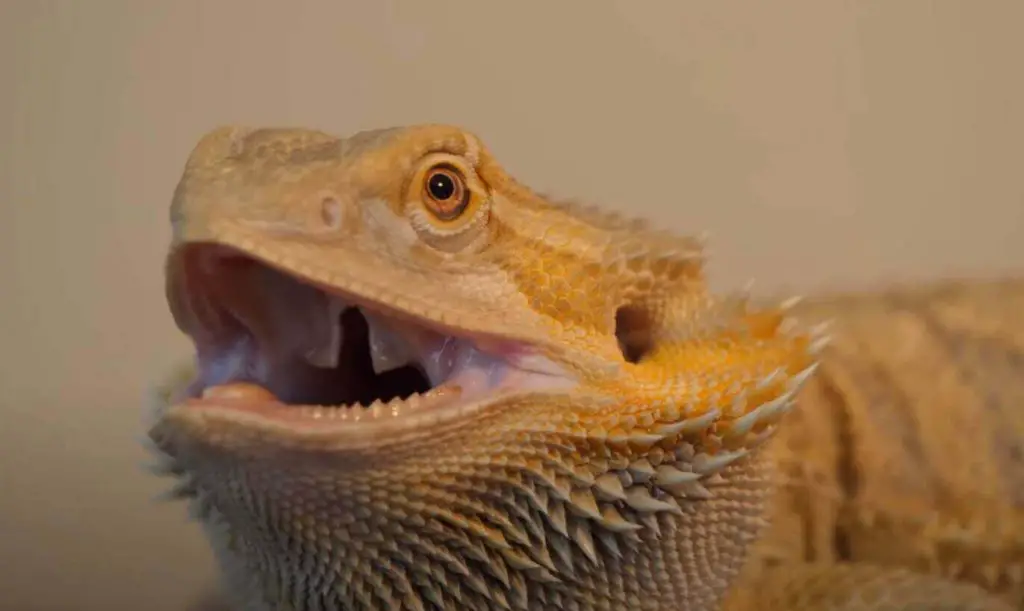
The fact that your beardie blackens its beard, is on guard immediately, accompanying with hissing may be an indication that he is ready to warm off anything that tries to challenge or encroach on the territory and be detected as threats.
a. By the Outside World
With an excellent ability to see as good as a human, your pet will be aware of the view outside the tank, so it is understandable for your beardie to be scared when seeing something that is not right in his regular life.
Something such as the other animals in the room, the birds flying near the window, a new piece of furniture, or new people in the house could be causing your pet to stressed and blackens his beard.
You could buy more hides and plants to put inside the enclosure for your beardie to prevent the view of the world outside the glass.
b. By the Other Friends
When the beardie beard is black and puffing, it will make the lizard look bigger and more threatening to the enemies.
It also happens when two in the same kind confront each other as a predicted sign for the unavoidable competition for territory and domination and even the females if it is a battle between two males.
The fight could also happen between males and females when they want to stay alone instead of mating.
If you do not want any of your beardies to get hurt and traumatized by the fight, you should never put any of them in the same tank or somewhere that they could see the other.
c. By Seeing Itself
The reason for “Why is my bearded dragon beard black and puffing” could be that dragons see the reflections of them and think of them as the interlopers.
In this case, when they are showing that they do not welcome by hissing, darken their chins, and puffing, their “encroachers” will do the same, threatening them.
Your pet will be stressed and threatened when the “stranger” is still in their home and does not go away.
To solve the problem, you could increase the intensity of UV lights so that the reflection would never appear on the glass of the tank and never put mirrors anywhere near the cage that your pet could see.
6. Feeling Excited
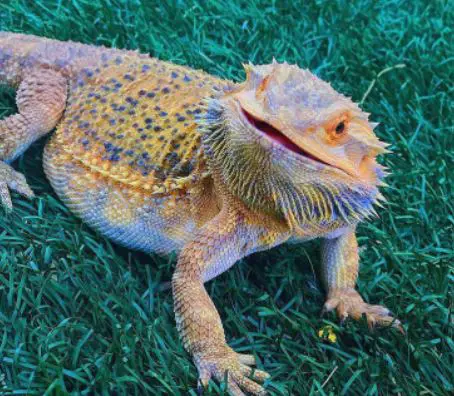
The bearded dragon’s black beard not only happens when he feels threatened and aggressive but also when seeing something interesting that brings excitement.
If it is the reason for the black beard on beardies, you should not be worried.
For example, when you bring the favorite food of your pet in front of him, your beardie may turn his beard darker.
It could also happen when he sees you come home after a long day, just the way to show the excitement.
Related Posts:
- Can Beardies Eat Rosemary?
- Do Beardies Eat Brussel Sprouts?
- Can Beardies Eat Peas?
- Can Beardies Eat Honeydew Melon?
- Do Beardies Eat Dill?
- Can Beardies Eat Radish Greens?
- Can Beardies Eat Chard?
7. Annoyed or Mad
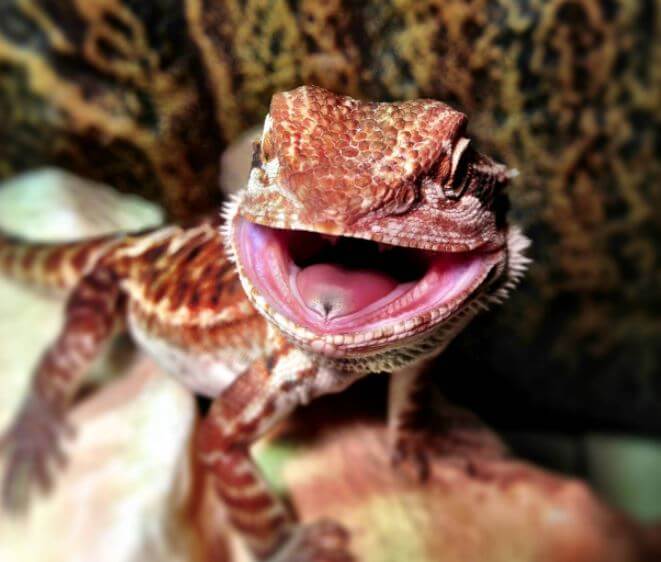
Just like how your face may turning red when you are angry. It could be possible for your beardie to darken his beard when being angry or annoyed.
And you may make your pet get frustrating in the following situations without notice.
a. You Are Invading Their Privacy
The beardies are loners so they need to be relaxed in their private space and time.
It is good that you could spend a lot of your time with your pet. But it would be also necessary to let him have time for himself, be alone, and not be bothered.
If you impact his “alone time” too many times, he becomes upset and feels uncomfortable
b. It Doesn’t Like Taking a Bath
Mostly, beardies would like to have a nice, warm bath.
But some of them will show unhappy signs such as turning their chins darken, hissing, and being mad.
You should find a way to make them get used to getting a shower or try misting them instead.
8. Lack of Trust
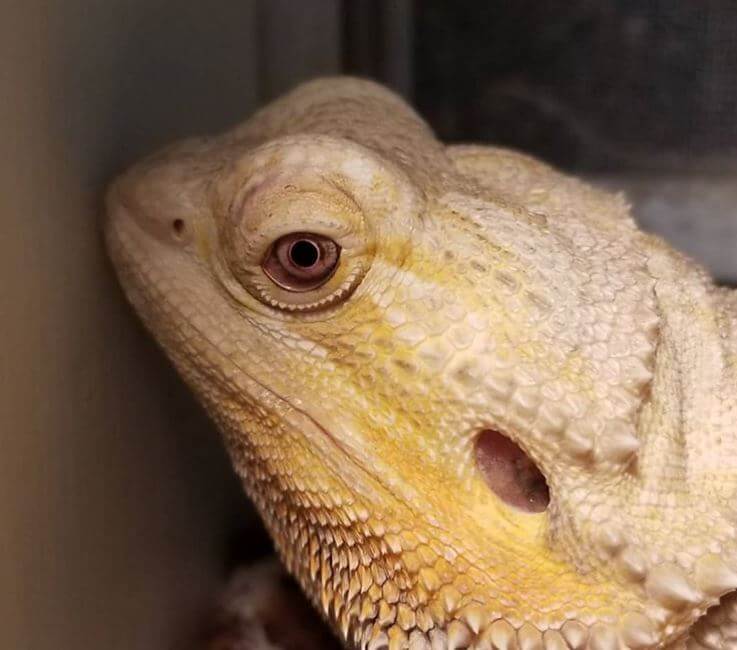
a. You Are a New Owner
In case you just have baby beardie recently, it will not be surprising if your beardie beard is black and puffing for the first couple of days or even a month.
The reason for that is that he is just afraid of you because your body is bigger and scarier compared to him.
And you could be the potential threat that could kill him easily.
So, all you and your pet need is more time to be familiar with each other. And soon, your beardie will get used to you.
b. You Are Approaching in the Wrong Way
When you grab your pet from above, it is normal for the beardie to hiss at you. Because it would consider you as a predator and try to scare you off.
Or maybe you make him hurt by the place you grab it.
9. Sickness
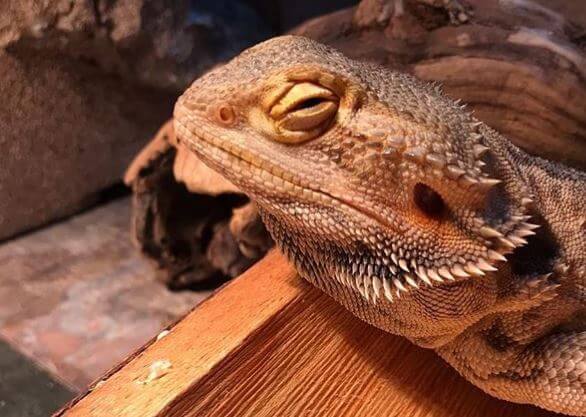
The black beard on bearded dragons is not enough to go to the conclusion that your pet is sick because of many other reasons.
However, even if the illness may not be the most common reason.
You should not cross out the possibility of it.
Having a general knowledge about other symptoms of the disease that your pet can acquire is essential to make sure that your beardie is okay or not.
For instance, a beardie has a black beard and tail, the other parts of the body such as its neck.
It becomes lethargic, doesn’t move or eat much, poop irregularly, and sleep all day.
In this case, bringing your pet to see a vet may be a good idea.
In case the beardie has black beards but not for long, and still behaves like usual, he may be just healthy as normal, not being sick.
10. Readying to Poop
It could be unbelievable to know but your beardie may have his beards darken when he is going to excrete.
Some of them will have that “signal” whenever they want to poop but some never have.
If this is the reason, their beard will return to normal after a few hours before going.
Frequently Asked Questions About Bearded Dragon’s Beard
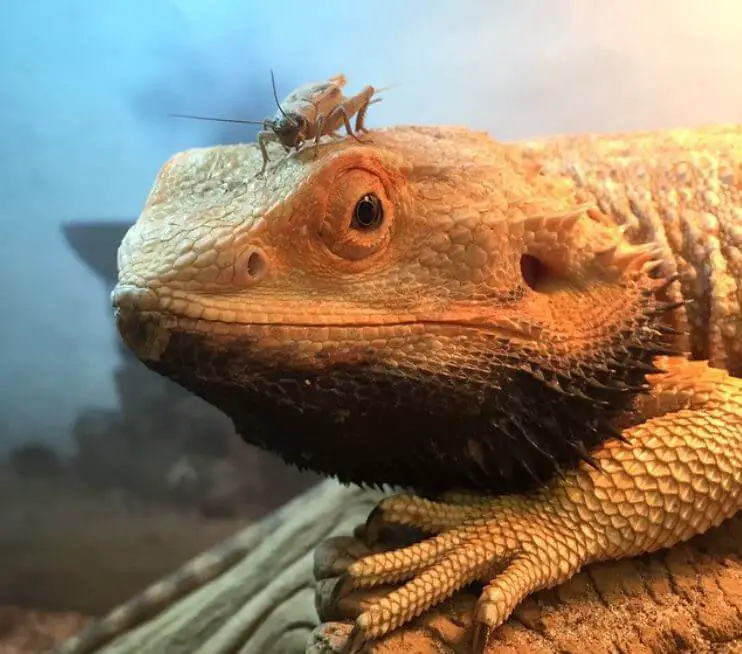
1. What Should I Do With a Black Beard Bearded Dragon?
First, do not panic. There are many reasons to explain such as hungry, being frightened, feeling threatened, wanting attention…
You could just give him time to calm down by himself or solve the problem that makes him stressed.
2. Does the Black Beard on Bearded Dragons Only Happen Due to Stress and Aggression?
Actually, your pet does not only darkens his beard when being stressed or aggressive but also when he wants your attention or he is excited.
In this case, your beardie will not display his terrifying acts such as hissing or puffing his head. So, you do not have to worry.
3. How to Know If My Bearded Dragon Is Sick or Not When It Darkens Its Chin?
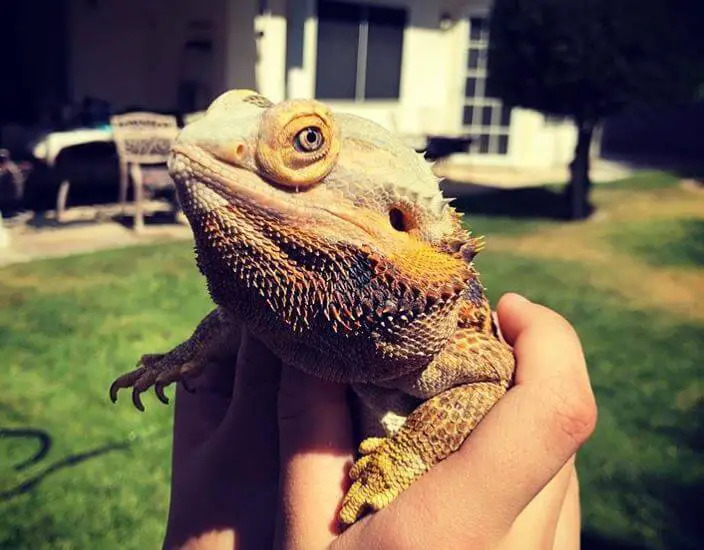
To make sure if he is healthy or not, you should notice about your pet’s daily activities such as eating, sleeping, and pooping.
In the case that he still behaves like normal, then you do not have to worry but still need to keep an eye on him.
On the other hand, in case of beardie beard staying black for a long time, come along with losing his appetite, you should bring him to a vet to ask for advice.
4. Why Is My Bearded Dragon’s Beard Black When It Meets My Other Pets?
It is normal for your beardie to be uncomfortable when being around other animals.
They may show the unwelcome and aggressive behaviors when seeing other pets in their territories.
You should prevent your other pets such as dogs or cats from coming into the room that the tank is located.
5. Is It Normal for My Bearded Dragon to Turn Its Chin Black?
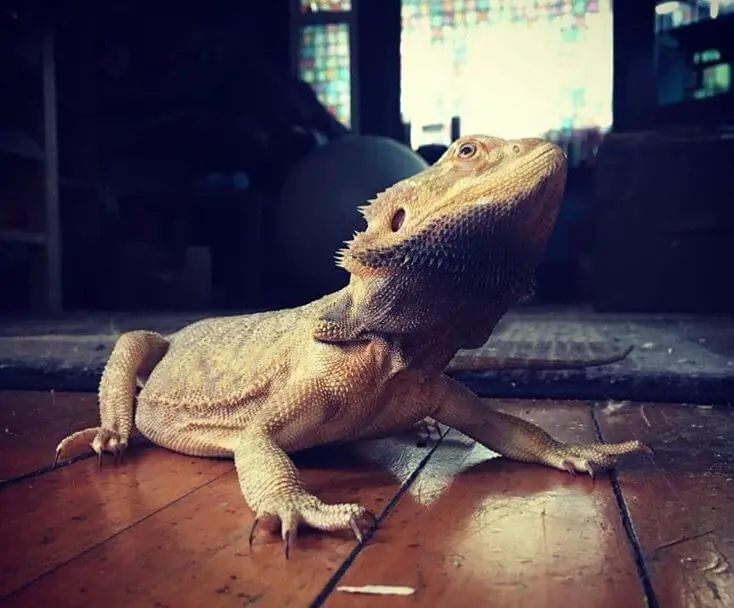
Yes, it is totally normal for your bredie to blacken his beard.
Actually, there are so many occasions that make the bearded dragon black beard, when something is wrong or maybe nothing to worry about.
All you need to do is finding the reason and solution in order to make sure your pet is happy and stays strong.
Conclusion
Hoping this article not only helps you to figure out the answer to your question: “Why is my bearded dragon’s beard black?” but also gives you the solution that you need. Wish you and your beardie all the best in life.
Key points for why your bearded dragons beard is black:
The color change in a bearded dragon’s beard, known as “beard blackening,” is a noticeable and intriguing behavior. This change in beard color is a communication tool and can signify various emotions and responses. Here are common reasons why a bearded dragon’s beard turns black:
1. Stress and Anxiety:
- Bearded dragons often blacken their beards in response to stress or anxiety.
- Factors like excessive handling, sudden movements, loud noises, or changes in their environment can trigger this reaction.
2. Threat Display:
- A black beard is a classic threat display.
- Bearded dragons use this response to intimidate potential predators or rivals and signal their readiness to defend themselves.
3. Aggression:
- During territorial disputes or confrontations with other bearded dragons, a black beard can indicate aggression.
- Males, in particular, may blacken their beards when competing for dominance or mating rights.
4. Mating Behavior:
- In the context of mating, both male and female bearded dragons can display a black beard.
- Males blacken their beards to court females, while females may do the same to signal their receptivity.
5. Illness or Discomfort:
- Health issues, such as respiratory infections or digestive problems, can cause stress and discomfort in bearded dragons, leading to beard blackening.
- When accompanied by other concerning symptoms, this can indicate a health problem.
6. Environmental Factors:
- Unsuitable or extreme environmental conditions, including incorrect temperatures or lighting, can stress bearded dragons and cause beard blackening.
7. Overstimulation:
- Bearded dragons can become overstimulated by excessive interaction, which may lead to beard blackening.
- Monitor their behavior and give them periods of rest to prevent overstimulation.
8. Female Beard Darkening:
- Female bearded dragons may blacken their beards during egg-laying (gravidity).
- This is a nesting behavior and indicates the need for a suitable egg-laying site.
9. Handling and Interaction:
- Some bearded dragons are more sensitive to handling than others, and they may react by darkening their beard when picked up.
- Gradual and gentle handling can help minimize this response.
10. Basking and Temperature Regulation: – Bearded dragons often darken their beards during basking. – This behavior helps dissipate excess heat and regulate their body temperature.
11. Age and Individual Variations: – The frequency and intensity of beard blackening can vary among individual bearded dragons. – Young bearded dragons may be more prone to this behavior during periods of adjustment.
12. Observation and Monitoring: – To understand the specific reason for your bearded dragon’s beard blackening, closely observe their behavior and surroundings. – Address any issues related to stress, illness, or discomfort promptly.
In summary, a bearded dragon’s beard blackening is a multifaceted behavior that can convey different emotions and responses. Understanding the context and triggers of this behavior is essential for proper care and interaction with your pet. Regular observation, providing a suitable environment, and minimizing stressors can help ensure a healthy and happy bearded dragon. If you have concerns about your pet’s behavior or health, consult a reptile veterinarian for guidance.
Further Reading:
- Carolina Custom Cages Terrarium Review
- 8 Best Basking Rocks for Beardie: What Is the Best Choice?
- 10 Best Thermometers for Beardie: How to Choose the Best One?
- 5 Best Beardie Lighting Setups for Beardie Lovers
- 9 Best Heat Lamps for Beardie: Natural Habitat Provided

